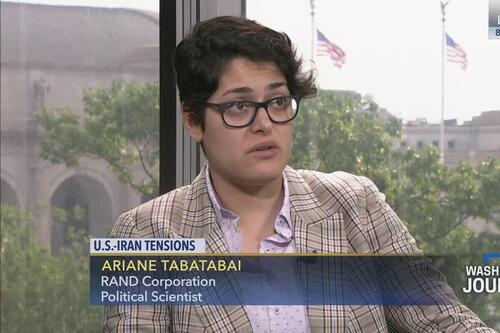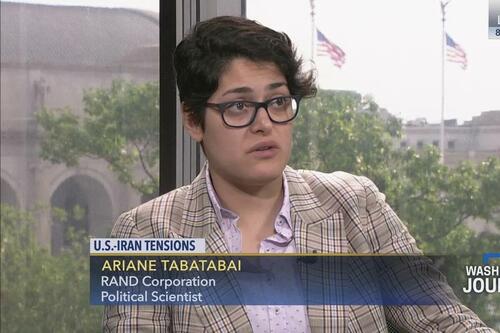The Curious Case Of Ariane Tabatabai
Authored by Jay Solomon via The FP.com,
A senior Pentagon official faced scrutiny when her past ties to Iran came to light. Is that why she’s been transferred?
In the weeks leading up to Israel’s retaliatory strikes on Iran this Saturday, someone from inside the U.S. government leaked a cluster of highly sensitive documents outlining the Jewish state’s military deployments.
We may never know the identity of the leaker—there are probably thousands of bureaucrats across the U.S. government who had access to the documents. But of those masses, a single name has been circulating online: Ariane Tabatabai, who’s served as a senior Defense Department official for the past two years.
There is no evidence we have found that Tabatabai is the leaker, despite the fact that various Arab and Israeli news sites reported as much.
In fact, Defense Secretary Lloyd Austin this week all but ruled out the culprit being Tabatabai or anyone else from the Pentagon.
But at the same time, the Defense Department, in recent days, quietly transferred the Iranian American academic out of her Pentagon post, which is among the most sensitive in the entire military: chief of staff in the Office of Special Operations and Low Intensity Conflict, or SO/LIC. The job has provided Tabatabai unique access to the highest levels of classified intelligence as well as knowledge of virtually all global U.S. special military operations.
Instead, the Pentagon notified Congress on Friday, October 25 that Tabatabai was “transitioning to her new office” in troop education and training, without specifying the exact date when she left her last post. The new position, Deputy Assistant Secretary of Defense for Force Education and Training, has significantly less access to intelligence and covert military programs, according to former Defense Department officials interviewed by The Free Press.
The Pentagon press office declined to answer questions provided by The Free Press about Tabatabai’s status or the reasons for her transfer. And her job change is likely to deepen questions from Capitol Hill Republicans who’ve been seeking answers for more than a year about Tabatabai’s past interactions with the Iranian government.
Tabatabai was brought into the Biden administration in 2021 to serve on the State Department negotiating team with Iran. Her initial boss, Special Envoy Robert Malley, however, was stripped of his security clearance in the spring of 2023 and is currently being investigated by the FBI for the mishandling of classified information.
Shortly before Malley’s departure, Tabatabai relocated to the Pentagon and eventually took up her position in SO/LIC.
Tabatabai began facing scrutiny last year after a large tranche of Iranian government emails were obtained by the U.S. media outlet Semafor (where I used to work), and Iran International, a Farsi-language television channel.
Included in the data were communications between Tabatabai and senior Iranian diplomats, beginning in 2014, that showed she had been a leading member of the Iran Experts Initiative, an Iranian Foreign Ministry–led program that sought to amplify Tehran’s positions on key national security issues in Western think tanks and the media. In some of the emails, Tabatabai can be seen seeking guidance from Iranian officials on her foreign travels and appearances before Congress.
Tabatabai has never publicly disclosed her role in the IEI.
And a number of Republican members of Congress have been pressing the Pentagon over the past year to strip Tabatabai of her security clearances because of her reported ties to Tehran. The Pentagon declined on Friday to say if her transfer was related to her work with the IEI.
This month, a conservative government watchdog also sued the Pentagon for what it claims has been the department’s failure to answer questions and provide documents related to the activities of Tabatabai and Malley.
Tabatabai’s status is particularly sensitive for the Biden-Harris administration. The academic has worked closely in the past with Vice President Harris’s national security adviser, Philip Gordon, as outlined in an August piece in The Free Press. This included co-authoring a string of opinion pieces in the summer of 2020 that called for the U.S. to return to its nuclear diplomacy with Iran, and to soften some of Washington’s economic sanctions on Tehran.
Tabatabai’s switch at the Pentagon, on paper, is a promotion: The UK-educated PhD is now ranked as a deputy assistant secretary of defense rather than a chief of staff. But in reality, a number of former U.S. defense officials told The Free Press, it’s a clear step down.
“Everyone that is in the know understands that this is not a promotion, right? She wants to be active in the policy space, and going over to education and force training is not,” said Garrett Exner, who served in SO/LIC during the Obama and Trump administrations, and is currently a fellow at the Hudson Institute.
Exner added: The Biden administration transferred Tabatabai to a department “where she can’t really touch any classified material.”
A second SO/LIC veteran said the Iranian American academic has exited a post that’s among the most secretive in the entire U.S. government. “I cannot underscore: The things SO/LIC. . . are doing are more sensitive than what the CIA is doing.”
Tyler Durden
Wed, 10/30/2024 – 12:25


